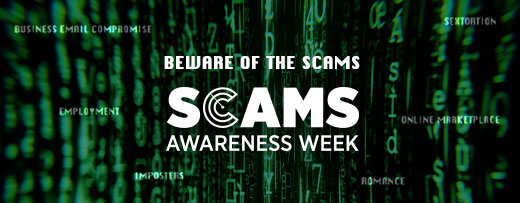Scams Awareness Week

Scams Awareness Week is an annual event which aims to reduce the impact of scams by raising awareness and encouraging the public to talk about scams and report them.
This year Scams Awareness Week takes place from 27 November to 1 December, with this year’s theme targeting ‘impersonation scams’.
Anecdotally, approximately 80 per cent of all scams reported to Scamwatch include some form of impersonation of a legitimate entity. Cryptocurrency and the use of gift cards continue to be used as a transfer of value for many scams amongst other common payment methods.
Scammers often impersonate a person, an organisation or brand, which may be received online, via email, phone calls or text messages.
Online scams have skyrocketed so far in 2023, with new data revealing that 209,466 scams have been reported this year, costing Australians $367 553 759. Almost $20 million has been lost to scams in South Australia alone.
This year SA Police’s Financial and Cybercrime Investigation Branch is focusing on five major types of scams costing South Australians:
Sextortion
A form of online blackmail where a perpetrator threatens to expose sexually compromising images, video footage or information.
Scammers often manipulate or coerce someone into sending intimate images or videos, and then threaten to share them unless a payment is made.
Employment scams
Scammers will offer jobs over messaging or emails. The jobs appear high paying, with not a lot of effort involved. They pretend to be from a recruitment agency or other high-profile company, and often ask for money so those interested can start their job, or so they can receive their earnings.
The ‘employees’ are often tricked into paying small amounts at first for tasks or jobs. The tasks become larger and require the victim to pay more money to release funds owed.
Business email compromise
These scams are carried out when a scammer compromises legitimate business or personal email accounts through social engineering or computer intrusion to conduct unauthorised transfers of funds.
Intrusions occur often when an employee clicks on a suspicious link containing malware that can lead to unauthorised access or installation of unauthorised software.
Social engineering occurs when someone is manipulated by a scammer into doing what they want.
Romance scams
Dating and romance scams often take place through online dating websites, but scammers may also use social media or email to make contact.
These scams are also known as ‘catfishing’. Scammers typically create fake online profiles designed to lure people in. They may use a fictional name, or falsely take on the identities of real, trusted people such as military personnel, aid workers or professionals working abroad.
Marketplace scams
Scammers regularly advertise and sell false products, making the potential buyer pay a deposit or pay upfront.
Once a deposit or payment is made, buyers will never get anything in return. Scammers will even go to lengths of cloning a friend or a mutual friend to make you feel more at ease when making a purchase.
Tune into the SA Police and Neighbourhood Watch SA social media platforms during Scams Awareness Week for more information on these types of scams, and valuable scam prevention tips and advice.
For more information about scams or to report cybercrime, visit the Report Cyber or Scamwatch websites.